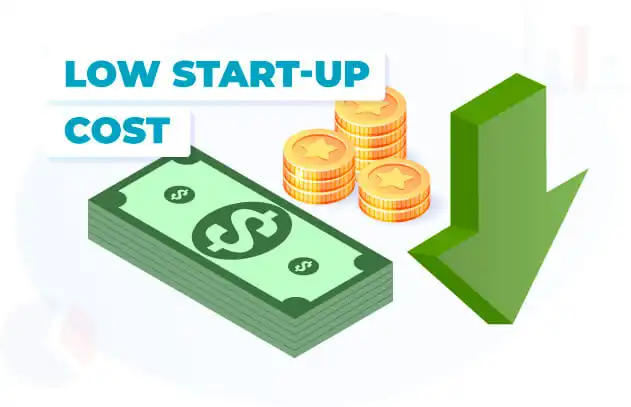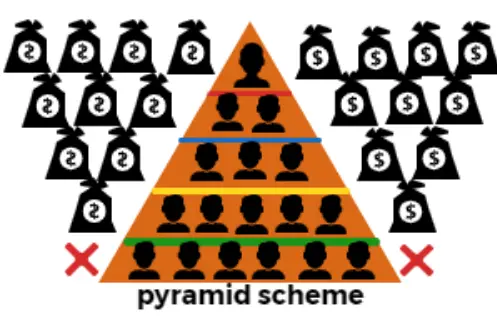Affiliate marketing is often seen as an exciting opportunity in this digital age, where there are many ways to make passive income and start your own business. However, one question keeps coming up: is affiliate marketing a pyramid scheme despite the allure of significant commissions and promises of financial freedom?
Join us on an enlightening expedition into the intricate world of affiliate marketing. We’ll navigate through its complexities, unravel its mysteries, and ultimately, answer the burning question: is it a pyramid scheme or a legitimate business model?
Affiliate marketing is a dynamic and mutually beneficial relationship between businesses and individuals who promote their products or services.
It’s not just a new way of marketing; it’s a revolution that has swiftly gained fame and is now a cornerstone of online shopping.
Its impact on e-commerce is profound. It enables businesses to reach a vast audience and empowers individuals to monetize their online presence.
Even so, there is a shadow of uncertainty among the huge successes and rapid growth. Are these affiliate programs really ways to make money, or are they just pyramid scams that look like real businesses?
To find the truth, we start by fully investigating the complexities of affiliate marketing, breaking it down into its many parts and revealing the truth behind the hype.
Come with us as we figure out how to get around in the confusing world of affiliate marketing and tell fact from myth.
Now is the time to face the facts and start an educational journey in affiliate marketing.
Understanding Pyramid Schemes: What Are They and How Do They Work?
There are a lot of things that need to be understood about pyramid schemes before we can get into the specifics of affiliate marketing.
At its core, a pyramid scam is a dishonest way to run a business. It works by tricking people into joining a hierarchical structure where early investors promise others high returns on their money.
Often, these scams look like real businesses, but they don’t have a long-term product or service to sell.
One thing that makes pyramid scams unique is that they focus on getting new members instead of selling goods or services. People who join the plan are encouraged to get other people to join by promising them commissions or bonuses for every new person they bring in.
The first investors at the top of the pyramid get the most out of the plan as it grows, while those at the bottom have a harder time getting their money back.
The way pyramid scams work is pretty simple, but they are still misleading. To join the plan, new members often have to make an initial investment or buy a product or service.
This money is then used to pay fees to people higher up in the pyramid, making it look like the business is making money.
That being said, the scheme will fail when recruitment stops or hits saturation because it depends on a never-ending cycle of new people joining.
It is very important to know the warning signs of pyramid schemes so that you don’t fall for these unfair schemes.
Promises of high returns with little work, a focus on getting new people to join, the lack of a real product or service, and a structure that rewards early investors at the expense of later recruits are all typical red flags.
By becoming familiar with these red flags, we can better find our way around affiliate marketing and tell the difference between real chances and scams.
Affiliate Marketing: What Is It and How Does It Work?

Now, let’s talk about partner marketing, which is the main point of our conversation. Affiliate marketing is a type of performance-based marketing in which companies pay people (called “affiliates”) for bringing people to their goods or services or making sales through their marketing.
The process starts when a company sets up an affiliate program. This company is called the merchant or marketer. Affiliates can use tracking links or coupon codes that are special to them to promote the merchant’s goods or services.
Affiliates get paid a commission or a set prize when a customer clicks on their link and then buys something or does something they want to do, like signing up for a newsletter or filling out a form.
Affiliate marketing is a win-win situation because it helps both businesses and affiliates. Affiliate marketing is a cheap way for businesses to reach more people and make more sales without having to pay for marketing up front.
It’s a low-risk way to advertise because they only pay for results. If you’re an affiliate, on the other hand, you can make money from your blog, website, social media account, or email list by promoting goods or services that are relevant to your audience.
Affiliate marketing is great because it is easy to use and can be expanded. Affiliates can pick and choose which goods or services to promote, change their marketing strategies based on what their audience wants, and work at their own pace.
On the other hand, merchants gain from the huge network of affiliates who act as brand ambassadors and tell people all over the internet about their products.
Merchants and affiliates collaborate in affiliate marketing to benefit both parties. Each successful deal benefits both parties.
By learning the basics of affiliate marketing, we can see how it fits into the digital economy and tell it apart from less trustworthy business models like pyramid scams.
Types of Affiliate Marketing Programs
There are different types of affiliate marketing programs to meet the needs and desires of both merchants and affiliates.
Here are some popular types:
Pay-Per-Sale (PPS): Affiliates get paid a fee for every sale they help make.
Pay-Per-Lead (PPL): Affiliates get paid a fee for every qualifying lead they send to a merchant.
Payment-Per-Click (PPC): Affiliates get paid a fee based on how many times their partner links are clicked on, even if no sale happens.
Revenue Sharing: Affiliates get a share of the money that their leads bring in over a certain time period.
Through two-tier programs, affiliates get paid for both their own sales and the sales of affiliates they’ve brought into the program.
Key Players in Affiliate Marketing
Affiliate marketing communities are made up of many different players, and each one is very important to the success of the program.
These important players are:
Merchants or Advertisers: People or businesses that sell goods or services and ask supporters to promote them.
Affiliates or Publishers are people or businesses that support a merchant’s goods or services in several different ways.
Partner networks are middlemen that connect merchants and affiliates and offer a way to track, report, and manage partner relationships.
Consumers are the end users who interact with affiliate marketing content and then buy something or do something else that affiliates want them to do. This makes money for businesses and affiliates.
By learning about the differences between affiliate marketing methods and the roles of different stakeholders, we can better understand how affiliate marketing works and where it fits in the bigger picture of digital life.
What are the Benefits of an Affiliate Marketing Program?
Affiliate marketing programs have many benefits, making them a good choice for people and businesses that want to reach more people and make more money.
Cost-effective Marketing

One of the best things about partner marketing is that it doesn’t cost a lot of money. Affiliate marketing doesn’t require big investments up front like standard forms of advertising do.
Instead, it’s based on how well it does. It’s a very effective and inexpensive way to market because merchants only pay for real results, like sales or leads produced.
Affiliate marketing lets businesses use the large networks and audiences of their affiliates. A wide range of people can see their ads.
Affiliates often have niche-specific audiences or followers who trust their advice. This lets merchants reach very specific groups of people that might be hard to reach through standard advertising channels.
More sales and money
Merchants can make a lot more money and sell a lot more by using the advertising work of affiliates.
Affiliates go out and promote a merchant’s goods or services to their followers, like brand ambassadors. Their recommendations carry weight and trustworthiness, which leads to higher conversion rates and, in the end, more money for the merchant.
Performance-Based Incentives
Affiliate marketers encourage affiliates to do well by giving them rewards based on how well they do.
Affiliates want to get results because their wages depend on how hard they work and how well they do. This is true whether they’re trying to get sales, leads, or other actions that are wanted.
Flexibility and Scalability
Affiliate marketing programs give both businesses and affiliates the freedom to grow and change. By adding more agents and reaching more people, merchants can easily increase the size of their marketing efforts without having to pay a lot more.
In the same way, affiliates can promote a variety of goods or services in different niches, which helps them make more money and find new ways to make it.
Low Risk and Low Investment
Unlike traditional businesses or advertising efforts, which come with risks and costs up front, affiliate marketing only needs small investments from both merchants and affiliates.
Affiliates can join programs for free and only have to pay a small amount to promote goods or services. Merchants only pay commissions when certain actions are taken.
How to Tell the Differences Between Affiliate Marketing and Pyramid Schemes?
Differentiating Affiliate Marketing from Pyramid Schemes

Affiliate marketing and pyramid scams may have some superficial things in common, like the promise of making money through referrals, but their main ideas and structures are very different.
Affiliates get paid commissions for pushing real goods or services and bringing in customers or leads. What matters is the exchange of value and the sale of real things or services.
Pyramid scams, on the other hand, focus mostly on getting new members and not much on selling goods or services. People who join the scheme are given incentives to bring in more people.
This creates a hierarchy that helps early investors more than later recruits.
Identifying Similarities and Differences
You can earn commissions through referrals in both affiliate marketing and pyramid scams, but there are some important differences to keep in mind.
Affiliate marketing follows the law and is moral, and deals between merchants and affiliates are clear. There is a clear exchange of value when affiliates are paid based on how many sales or leads they bring in.
Pyramid scams, on the other hand, are usually not clear or legal, and the focus is more on recruiting people than selling products.
People who join may be given false promises of high returns or be pushed to get other people to join the scheme so they can make money. Eventually, the scheme will fail, and most people who join will lose money.
Legal Distinctions
Affiliate marketing is a legal way to run a business as long as it follows the rules and regulations.
Laws and rules that merchants and affiliates must follow include the Federal Trade Commission (FTC) guidelines, which require affiliate ties to be made public and marketing practices to be clear.
On the other hand, pyramid plans are against the law in many places and are rarely broken without strict measures.
There are legal implications, such as fines, penalties, and even criminal charges, for people who join or promote pyramid schemes.
Is Affiliate Marketing a Pyramid Scheme?

Now, let’s talk about the important question: Is Affiliate Marketing a Pyramid Scheme? People have argued and been skeptical about this question, but to find the answer, we need to look at the basics of both affiliate marketing and pyramid scams.
At its core, affiliate marketing is a clear and mutually beneficial system in which businesses pay affiliates for bringing in sales or leads through legal advertising.
Affiliates get paid fees based on how well they do, and the program only works if real goods or services are sold.
This model is in line with good business practices and government rules, which encourages openness and responsibility.
Pyramid scams, on the other hand, are based on lying and taking advantage of people. They get people to join by saying they can make a lot of money quickly.
These schemes depend on constantly hiring new people and don’t put much or any focus on selling goods or services. People are forced to invest money with the hope of making money from recruiting others. This builds a hierarchy that eventually falls apart, leaving most of the people who invested money with no money.
Affiliate marketing and pyramid scams may look a lot alike at first glance, but their basic ideas and ways of working are very different.
Affiliate marketing is based on honest business practices and focuses on promoting and selling goods or services. Pyramid schemes, on the other hand, use dishonest and short-term business methods to take advantage of people for money.
Affiliate marketing is not a pyramid scam, to sum it up. Affiliate marketing can be a legal way to make money online if people know the differences between the two and follow ethical standards.
Risks and Challenges
Saturation and Competition
As affiliate marketing grows in fame, there are more and more companies competing for the attention of customers. Affiliates may find it hard to stand out from the crowd and get the attention of their target group because of this.
Increased competition may also cause fees to go down and affiliates to make less money, so they need to come up with new ways to stand out and find their place in the market.
Dependency on Third-party Platforms
A lot of affiliates use third-party platforms, like search engines, social media networks, or affiliate networks, to promote goods or services and get people to click on their affiliate links.
These platforms can help you get more publicity and interact with your audience, but they can also make you dependent on them.
If these platforms change their algorithms, policies, or terms of service, it can make it much harder for affiliates to reach their viewers and make money.
Using third-party platforms also makes it harder for affiliates to manage their marketing outlets and can leave them open to sudden problems or bans.
Ethical Considerations
In affiliate marketing, ethics are very important because marketers must be honest and trustworthy in their advertising.
People who don’t tell their audience about affiliate relationships, use dishonest marketing methods, or lie about goods or services can lose credibility and trust with their audience.
Also, affiliates have to deal with moral problems, like promoting items that might not be relevant or of good quality just to make money.
Finding the right balance between financial incentives and morals is important for building long-term relationships with viewers and keeping the affiliate marketing ecosystem honest.
Common Misconceptions
Misinterpretations of Affiliate Marketing
One common false idea about affiliate marketing is that it’s a scam or a way to get rich quick.
Affiliate marketing is seen by some as an easy way to make money online, but they don’t fully understand how much work, time, and planning are needed to be successful.
This wrong idea hurts the real chances affiliate marketing gives people and doesn’t see how valuable it is for both businesses and affiliates in increasing sales and reach.
Debunking Pyramid Scheme Allegations
People also get affiliate marketing and pyramid scams mixed up, which is not accurate. Both involve getting paid for referring others, but the main difference is in how they work and what they are based on.
Affiliate marketing follows the law and only promotes and sells real goods or services. Pyramid scams, on the other hand, focus on recruiting new members and not selling anything, so they eventually fail because their business models can’t last.
By denying these claims, we can make the differences clear and get rid of false worries about partner marketing.
Addressing Public Perception
Even though affiliate marketing is legal, people may still look down on it and be skeptical because of false information and misunderstandings.
To change people’s minds about affiliate marketing, you need to teach them about its rules and methods and show how it helps e-commerce grow and gives people the tools they need to make money from their online platforms.
By encouraging honesty, openness, and moral behavior in the affiliate marketing community, we can change how people think about this changing business and help them understand it better.
Impact of Technology and Innovation
Role of Technology in Affiliate Marketing
Technology has completely changed how affiliate marketing works. Now that there are more advanced tracking and analytics tools, merchants and affiliates can learn more about how customers behave, which lets them make more focused and personalized marketing campaigns.
Automation tools make tasks like creating links, keeping track of them, and reporting easier, which increases speed and allows for growth.
Also, progress in artificial intelligence (AI) and machine learning makes predictive analytics and algorithmic optimizations possible. This lets affiliates improve their tactics and get better results.
Emerging Trends and Technologies
The technologies and trends that affect partner marketing change along with the digital world. Influencer marketing is becoming more popular.
In this type of marketing, affiliates use their authority and influence in certain niches to promote goods or services to their audience.
Affiliate marketing can now be done in new ways, thanks to social commerce platforms and live streaming technologies that let people interact and get direct product tips in real time.
Augmented reality (AR) and virtual reality (VR) technologies can also be used in affiliate marketing efforts to make shopping more immersive and increase conversion rates.
Future Outlook
Affiliate marketing has a bright future ahead of it thanks to constantly improving technology and changing consumer habits.
As more people shop online on their phones and computers, mobile commerce (m-commerce) is set to become an important part of affiliate marketing.
Cross-device tracking and attribution models will be needed to get a good picture of how affiliate marketing works across many interactions.
Also, blockchain technology could make the affiliate marketing environment more open, safe, and trustworthy, which would reduce fraud and make payment processes better.
Expert Opinions and Perspectives
Insights from Industry Experts
People who are masters in affiliate marketing share their knowledge on best practices, new trends, and regulatory issues in the field through interviews, articles, and conference talks.
Their ideas shed light on the moral problems, difficulties, and chances that affiliates and sellers face as they work their way through this ever-changing field.
Debates and Controversies
Arguments and controversies about pyramid scams and affiliate marketing offer a wide range of points of view to think about. Affiliate marketing supporters stress that it is legal and can help people make money.
However, skeptics raise real concerns about dishonest business practices, fraud schemes, and unethical behavior in the industry.
Looking at these arguments makes you think more critically and promotes a fair way of figuring out how complicated affiliate marketing is and what it means in a bigger picture.
Nuanced Perspectives
These give you a full picture of affiliate marketing, telling you about all of its pros and cons. Affiliate marketing does offer real ways for people to make money from their websites and for businesses to make more money, but it also comes with risks of fraud, abuse, and close scrutiny by regulators.
Different points of view agree on how important it is to be honest, follow the rules, and protect consumers in order to keep affiliate marketing honest and build trust with viewers.
We learn more about the many sides of affiliate marketing and what it means for the digital economy by putting together the ideas of experts in the field, looking into arguments and disagreements, and accepting different points of view.
By listening to different points of view and starting helpful conversations, we can make sense of the complicated world of affiliate marketing and make smart choices.
Building Trust in Affiliate Marketing
Importance of Trust and Credibility
Trust and credibility are what make partner marketing relationships work. People look for sincerity and trustworthiness from the sources they interact with online, where marketing messages are everywhere.
Affiliates can successfully influence customers to buy and build long-term loyalty if they build trust with their audience. In the same way, merchants benefit from working with reliable people who support their brand’s values and give their audience honest suggestions.
Strategies for Building Trust
In affiliate marketing, you need to take a multifaceted approach that puts authenticity, knowledge, and openness at the top of the list. This is how affiliates can build trust:
offering useful and pertinent material that teaches and informs their viewers.
Through high-quality material and personalized suggestions, they show that they are experts and authorities in their niche.
Building real connections with their audience by genuinely participating and responding to feedback.
suggesting goods or services that fit the wants, needs, and beliefs of their customers.
Being open about any incentives or commissions made from promotional efforts and telling people about any affiliate relationships.
Maintaining Transparency and Integrity
Being honest and open are important for keeping trust in partner marketing relationships. Affiliates must make their affiliate ties clear and obvious to their audience, so that anyone who sees them knows about any financial incentives that may be involved.
Affiliates should also stay away from dishonest marketing methods that hurt trustworthiness and trust, like making false claims or running misleading ads.
Affiliates can protect the integrity of the affiliate marketing environment and build long-lasting relationships based on trust by putting honesty, openness, and moral behavior first.
Success Factors and Best Practices
Effective Strategies for Affiliate Marketers
Affiliate marketers who are good at what they do use a variety of strategies to get the best results and have the most effect.
Here are some methods that work:
In-depth market study is needed to find niche opportunities and target audiences.
Making high-quality material that is useful, teaches, and keeps people interested.
Using a variety of marketing channels to reach a wide range of people, such as social media, blogs, email marketing, and video material.
Using SEO techniques to make affiliate content more visible and get more traffic from search engines.
Communicating in a clear and honest way builds confidence and trust with the audience.
Testing and improving affiliate programs to get the best return on investment (ROI) and conversion rates.
Keys to Sustainable Growth
Affiliate marketing needs a long-term view and smart planning to grow in a way that lasts. Some important factors for long-term growth are:
Promoting a range of goods and services in important niches can help you make more money.
Getting lots of people to sign up for your email list and getting to know them by sending them useful content and personalized suggestions.
Always improving and boosting affiliate tactics based on data about how well they work and market trends.
They are spending money on ongoing education and skill development to keep up with changes in the business and new technologies.
Getting your business known and respected in the affiliate marketing community.
Tips for Building Long-term Relationships
Building trust, loyalty, and mutual respect with both merchants and viewers is key to long-term success in affiliate marketing.
Here are some tips for making relationships last:
Integrity and openness should be valued in all interactions, such as telling others about affiliate ties and giving honest advice.
Being honest and proactive when talking to sellers to set clear goals and keep working together as a team.
Being genuine with the audience, paying attention to what they have to say, and answering carefully to their wants and needs.
Giving the audience ongoing value and support, beyond just advertising, to build long-lasting relationships and trust.
Spending time and effort building connections with other affiliates and people who have a stake in the industry, creating a community where people help each other and work together.
Affiliate marketers can optimize their chances of success and fully utilize affiliate marketing as a real and profitable business possibility by putting in place effective strategies, prioritizing long-term relationships, and focusing on long-term growth.
Conclusion
Last but not least, the question of whether affiliate marketing is a pyramid plan has been carefully examined, and the truth has been revealed.
Affiliate marketing and pyramid scams may look a lot alike, but they are actually very different in how they work, what they teach, and what they offer.
When done correctly, affiliate marketing is legal and moral, giving people honest ways to make money from their websites and helping stores make money.
Affiliate marketers can handle the complicated nature of the business with trust and faith if they put honesty, openness, and integrity first.
As you start out in affiliate marketing, remember to put sincerity first, act with honesty, and take advantage of the chances that come up in this fast-paced, always-changing field.
If you’re new to affiliate marketing or have been doing it for a while, be open to the possibilities, stay true to your values, and let your full potential shine in the world of affiliate marketing.
Hopefully, I have answered the query “whether affiliate marketing is pyramid scheme or not”. Please comment below with your opinions and thoughts about this post whther you found it helpful or not.
And I request you to subscribe to email newsletter to keep reciveing these kinds of informative content direclty in your inbox.
Frequently Asked Questions
Table of Contents
ToggleWhat is the difference between affiliate marketing and a pyramid scheme?
The main difference between affiliate marketing and a pyramid scheme is their fundamental structure and purpose. Affiliate marketing involves promoting products or services and earning commissions based on successful sales or referrals, while a pyramid scheme relies on recruiting participants and earning money primarily through recruitment fees, with little emphasis on actual product sales.
How can I avoid falling into a pyramid scheme disguised as affiliate marketing?
To avoid falling into a pyramid scheme disguised as affiliate marketing, look for red flags such as promises of high returns with minimal effort, emphasis on recruitment over product sales, and lack of transparency about the business model. Research the company thoroughly, ensure clear product/service offerings, and prioritize affiliate programs with reputable merchants and transparent commission structures.
What are some common misconceptions about affiliate marketing?
Common misconceptions about affiliate marketing include the belief that it's a get-rich-quick scheme, requires no effort, or involves only spammy promotion tactics. In reality, successful affiliate marketing requires time, effort, and strategic planning, and it's based on building genuine relationships with your audience and promoting valuable products or services.
Is affiliate marketing legal?
Yes, affiliate marketing is legal when conducted ethically and in compliance with relevant laws and regulations, such as disclosure requirements outlined by the Federal Trade Commission (FTC).
Can anyone become an affiliate marketer?
Anyone can become an affiliate marketer, regardless of background or experience. However, success in affiliate marketing requires dedication, persistence, and a willingness to learn and adapt to the ever-changing landscape of digital marketing.
How much money can I make through affiliate marketing?
The amount of money you can make through affiliate marketing varies depending on factors such as your niche, audience size, promotional strategies, and the commission rates offered by merchants. While some affiliates earn modest incomes, others generate substantial revenue through affiliate marketing.
Is there really money in affiliate marketing?
Yes, there is real money to be made in affiliate marketing for those who are willing to put in the effort and employ effective strategies. Many successful affiliates earn significant incomes by promoting products or services they believe in and building trust with their audience over time.
Can you lose money in affiliate marketing?
While affiliate marketing offers the potential for lucrative earnings, like any business endeavor, there are risks involved, and it's possible to lose money if you don't approach it strategically or invest resources wisely. However, with careful planning and diligence, the risks can be mitigated.
is high ticket affiliate marketing a pyramid scheme
High ticket affiliate marketing, if conducted ethically and transparently, is not inherently a pyramid scheme. However, it's essential to scrutinize high-ticket affiliate programs carefully to ensure they offer genuine value to customers and aren't primarily focused on recruitment or exaggerated promises of wealth.
Is affiliate marketing a get rich scheme?
No, affiliate marketing is not a get-rich scheme. While it offers the potential for significant earnings, success typically requires time, effort, and persistence. Approaching affiliate marketing with realistic expectations and a long-term mindset is key to building sustainable income streams over time.









